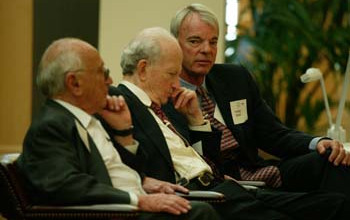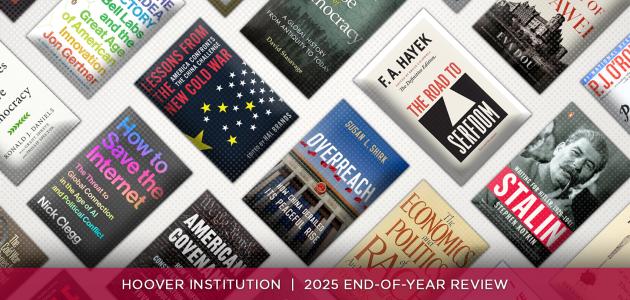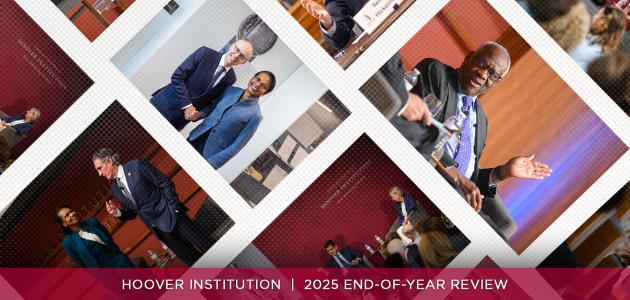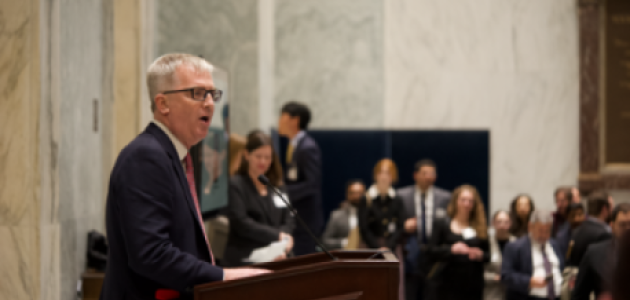"What is needed to keep prices stable is the will to do so," said Milton Friedman, Hoover fellow, in his remarks at a breakfast briefing hosted by the Hoover Institution on September 20. Friedman, Gary Becker, and Michael Spence, all Hoover fellows who are also Nobel laureates, were featured speakers at the event.
"The Federal Reserve System, in existence since 1914, did a terrible job the first 70 years or so," said Friedman. He went on to say that the Federal Reserve has been doing much better over the past 20 years. As he explained, the main function of the Federal Reserve is to preserve price stability and during the past 20 years inflation has been almost horizontal. He attributes this, in part, to the Federal Reserve chairman, Alan Greenspan, but believes it is wrong to attribute the change to him alone because the same thing has happened elsewhere. What changed, Friedman believes, is that central banks became persuaded that they could be architects of inflation and, as long as they remain focused on this, that they can keep prices stable.
Friedman received the Nobel Prize in 1976 "for his achievements in the fields of consumption analysis, monetary history and theory and for his demonstration of the complexity of stabilization policy." A senior research fellow at the Hoover Institution, he is also the Paul Snowden Russell Distinguished Service Professor Emeritus of Economics at the University of Chicago, where he taught from 1946 to 1976, and was a member of the research staff of the National Bureau of Economic Research from 1937 to 1981.
Taking into consideration the rising cost of gasoline, Becker discussed the causes and solutions to this problem. Becker, who won the Nobel Prize in 1992, is the Rose-Marie and Jack R. Anderson Senior Fellow at the Hoover Institution and a professor at the University of Chicago. He received the Nobel Prize in 1992 "for having extended the domain of microeconomic analysis to a wide range of human behavior and interaction, including nonmarket behavior."
Becker noted three shocks that have occurred in the oil industry: the first in the 1970s when OPEC formed, the second in the 1980s during the Iran-Iraq war, and the one that is occurring now. The first two could be attributed to a reduction in supply, but this is not the case now, when the supply has actually increased. He suggested that this current problem is due to demand, not supply. He cautioned against proposed actions such as rationing or regulating the price of gasoline. "The right way is to allow the consequences of the price to affect the quantity used," Becker said. The car industry and the type of autos and trucks that they produce will be affected by the type of cars and trucks that people want, which will be affected in turn by the cost of gasoline. Also, he warned that the refinery capacity in this country has gone down and that utilization has gone up, all independent of Hurricane Katrina.
 |
| Left to right: Milton Friedman, Gary Becker, and Michael Spence.
|
In his remarks, Spence assessed the future of China in light of its recent explosive growth. Displaying a chart of China's economic activity during the past 25 years, Spence noted that the country has shown tremendous growth. He attributed the growth, in part, to market reforms in agriculture starting in 1978, the opening up of manufacturing and foreign direct investment in the mid-1980s that came to full force in the 1990s, and skillful policy navigation in a transitional economy. These changes, he said, have been characterized by pragmatism and gradualism. The next set of challenges for the country, Spence said, will include maintaining high growth, expanding capital markets, managing the exchange rate, diversifying the sources of growth, and coping with environmental problems. "There are a lot of things to do in a complex market," he concluded. He does not expect the Chinese government to do anything dramatic, nor will it do anything under pressure.
Spence is a senior fellow at the Hoover Institution and the Philip H. Knight Professor Emeritus of Management in the Graduate School of Business at Stanford University. The Nobel Prize was awarded to him, George A. Akerlof, and Joseph E. Stiglitz in 2001 "for their analyses of markets with asymmetric information."
The event was cosponsored by the consulates general of Norway and Sweden in connection with the Nobel Prize Exhibition running at the Exploratorium through October 2. The Bank of Sweden (Sveriges Riksbank) Prize in Economic Sciences in Memory of Alfred Nobel was first awarded in 1969. The prize has since been awarded to works ranging from methodologies and theories used in studying the efficient use of economic and financial resources to macroeconomic performance and economic policy, development economics, international trade, and the role of information.













